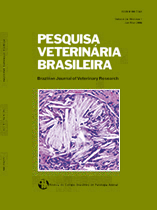 |
|
|
|
Year 2016 - Volume 36, Number 5
|

|
Evaluation of hemostatic abnormalities and thromboembolic risk in dogs with IMHA, 36(5):405-411
|
ABSTRACT.- Moraes L.F., Takahira R.K., Golim M.A. & Baggio M.S. 2016. [Evaluation of hemostatic abnormalities and thromboembolic risk in dogs with IMHA.] Avaliação das alterações hemostáticas e do risco tromboembólico em cães com AHIM. Pesquisa Veterinária Brasileira 36(5):405-411. Departamento de Clínica Veterinária, Faculdade de Medicina Veterinária e Zootecnia, Universidade Estadual Paulista, Botucatu, SP 18618-970, Brazil. E-mail: liviafm@gmail.com
Immune-mediated hemolytic anemia (IMHA) is the most common cause of hemolytic anemia and the most prevalent immune-mediated disease in dogs, which is classified in primary or secondary. IMHA has been associated with hypercoagulability state and thromboembolism has been referred as the most common complication. The purpose of this study was to correlate the possibility of hemostatic abnormalities and the thromboembolic risk in IMHA and in anemias of other etiologies. 76 dogs were selected, all exhibiting hematocrit lower than 20% and at least one clinical sign commonly associated with IMHA or breed predisposition. These dogs were tested for IMHA by flow cytometry. Hemostatic tests (platelet count, PT, APTT, TT, AT, PDF and D-dimer) as well as CBC, reticulocyte count, blood parasite search in peripheral blood smear, Ehrlichia sp. and leptospirosis tests were performed in all dogs. 59 dogs were positive for IMHA. The thromboembolic risk was characterized by the presence of three or more changes in the tests of the hemostatic profile. 74.6% cases of IMHA were attributed to infectious diseases and was mostly associated with Ehrlichia sp. (88.6%). 72.1% of dogs had thrombocytopenia and 57.6% had regenerative anemia with significantly higher values of metarubricyte and reticulocyte count. There were no significant changes between two anemic groups (positive and negative for IMHA). Anemic dogs had higher APTT mean value and lower AT and platelet counts mean values than the control group (p<0.05). 25 dogs with IMHA and seven dogs without IHMA had thromboembolic state. The specificity of PDF was lower (30.2%) than previous studies. The choice of the Ig class does not affect the diagnosis of IMHA. There were no correlation between the presence of antibodies bound to the RBC surface and the hemostatic tests, but there were a week correlation (p<0,05) between Ht(%) and APTT (r=-0.2621), AT (r=0.4297) and platelets count (r=0.5349) values. Anemia is associated with hemostatic abnormalities and thromboembolic risk, however the immune-mediated nature of the disease was not the determining factor for this condition. In part, these changes can be attributed to infection diseases seen in both groups (positive and negative for IMHA). The similar thromboembolic risk evidenced in both groups of anemic dogs does not exclude the relationship of immune-mediated involvement, but alert to the possibility of thromboembolism in anemic dogs with Ehrlichia sp. (negative for IHMA). Therefore, anemic dogs with clinical signs associated with thromboembolic risk should be evaluated for this complication, today poorly investigated in clinical routine. The high frequency of hemostatic abnormalities supports the importance of an early, effective and more accurate diagnosis, along with a preventive strategy and treatment. |
| |
|
|
| |
|
 |